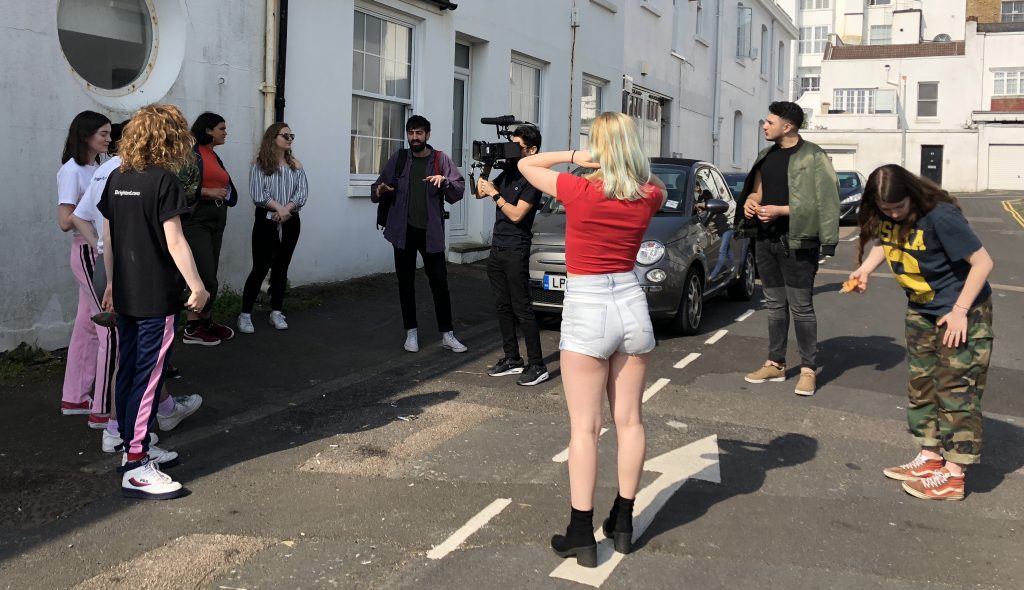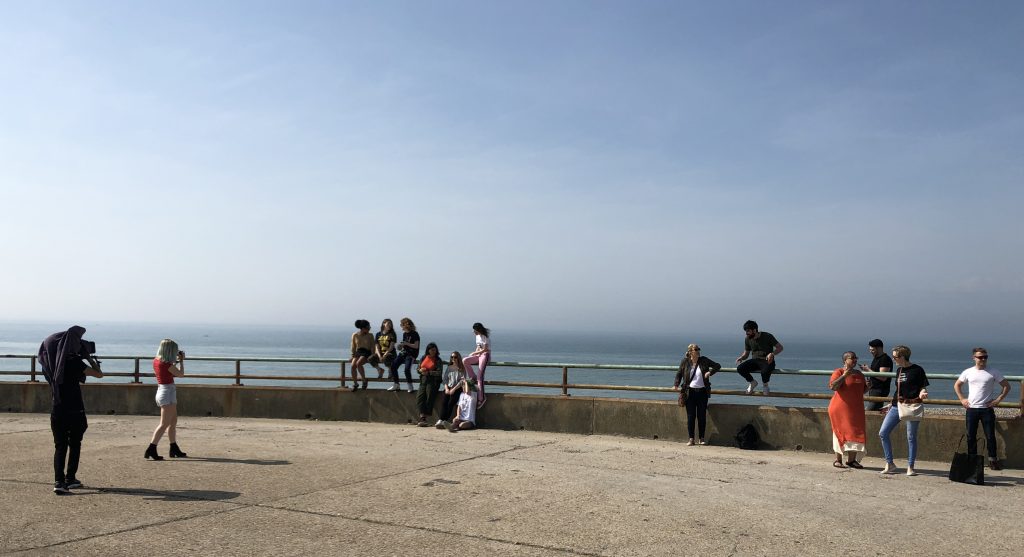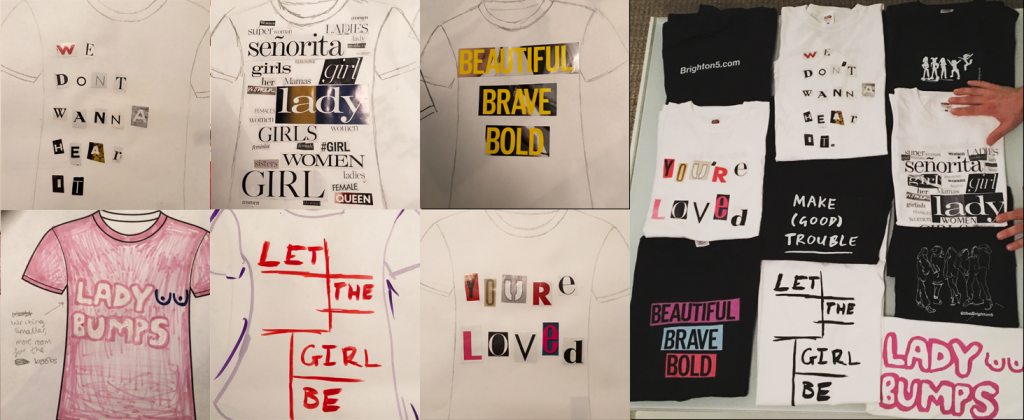
 On Saturday we filmed our crowdfunder video in Brighton. I hadn’t slept properly all week I was so nervous. In my head we only had one shot of getting it right, despite being told by all around me that we can edit or re-shoot if necessary. It would be the first time I would hand over control to strangers, when I had been the only person living and breathing this project on a full time basis for the last six months.
On Saturday we filmed our crowdfunder video in Brighton. I hadn’t slept properly all week I was so nervous. In my head we only had one shot of getting it right, despite being told by all around me that we can edit or re-shoot if necessary. It would be the first time I would hand over control to strangers, when I had been the only person living and breathing this project on a full time basis for the last six months.
In the planning phase, I researched successful crowdfunder videos and then, after talking to the Brighton5 teens wrote a script which I felt would resonate. My nephew Ellis (our music producer) mentioned his mate Javier was directing and producing ads, and was about to shoot Drake’s next music video. He suggested we all meet up in London. When we met I realised Jav did not rate my script at all. “Yeah – we don’t need that. We’ll shoot it for ya” – it was all very casual and easy going. I came away from the meeting absolutely terrified but knew if we were to make something that the teens think is cool, and want to be part of, I, at the marvelous age of 49 shouldn’t be the one to do it! Jav sent me links to his suggested Director’s work, Michael Holyk, and when I got home I watched some of the videos with my two teenage daughters. “YES MUM”. Obviously.
Then the wait began – we needed to get a date in the diary that all involved could do. Finally, Saturday April 21st was set. There were no pre-production meetings, no call sheets. Nothing. On Friday night about 11pm, I got an email from Jav with a list of questions – “why are we making this film?” etc. The answers to his questions were easy. This was the sum of our pre-production planning.
I was up at 5.30am on Saturday and a few hours later my house began to fill up with wonderful adult and teen contributors. By 9am, Director Michael Holyk and Camera Op Raja Virdi arrived. This was the first time we had all met. As soon as they entered the house I knew it was going to work. They both have a rather beautiful and calm aura about them. As Jav said – “Stop worrying, we do this in our sleep!” (not that they seem to get much of that). The three of them sat in my garden and talked. Meanwhile, I sat with Tayler, Saba and Jane in the kitchen worrying for Britain. The teens were busy being teens, sorting out what they were going to wear etc. while our stills photographer, 18 year old Mose, was already clicking away recording the proceedings.
Then filming began. Michael and Raja filmed the girls walking to the beach, goofing around, chatting. The weather was glorious. After about three hours we came back to the house for the one-to-one interviews. We filmed each girl in various rooms, where I asked them questions about their experiences of anxiety and depression. Their answers spilled out – eloquent, brave and beautiful. As one expressed, “I have never done this before – it feels so cleansing!” Thank you to Lola, Lotti, Ella, Chloe, Molly, Grace and Maya. HUGE respect.
Next up and about two hours later than planned we filmed our adults – parents and experts in the field of teens and pastoral care. I can’t thank Lorna Marsh, Fiona Paterson and Saba Ali enough. Their drive to help make positive change bowled me over. Once again eloquence and passion shone through.
Finally it was my turn. To appeal direct to camera to express why we need “YOUR” donation. I had printed out prompt cards the night before to be sure to remember everything. But unlike the other contributors to the film, I was not eloquent. It felt like my brain had fallen out and I couldn’t get my words out. We were eight hours into filming and I had completely forgotten how to speak. Director Michael politely stopped my pain. “Just tell it to me”. I went on a passionate rant about why it’s so important – being a mum of two teens; my worry about device addiction and why giving teens something TO DO and MAKE themselves is key. He smiled as I was ranting and then said “That’s it right there, we don’t need the other stuff”. Done. It’s a wrap. Knackered and over the bloody moon, the party began.
Michael and Raja had to get back to London as soon as the filming was complete, we didn’t want them to leave. Michael flew to Vietnam the next day to shoot a music video and is then flying on to LA for another project. That’s what success looks like.
Jav stayed and partied with us, a well earned end to a very very industrious day. Javier Alejandro is a kind, generous spirit. He pulled many favours to make this happen and invested his company cash too. A big thank you goes out to him.
Brighton5 is all about collaboration – bringing together great minds, creativity, passion and determination. Now, we wait for an edit date. But having worked so intensely with Jav, Michael, Raja, Ellis, Mose – all of our brilliant adults and teenage girls – we know it will be worth it.


 On Saturday we filmed our crowdfunder video in Brighton. I hadn’t slept properly all week I was so nervous. In my head we only had one shot of getting it right, despite being told by all around me that we can edit or re-shoot if necessary. It would be the first time I would hand over control to strangers, when I had been the only person living and breathing this project on a full time basis for the last six months.
On Saturday we filmed our crowdfunder video in Brighton. I hadn’t slept properly all week I was so nervous. In my head we only had one shot of getting it right, despite being told by all around me that we can edit or re-shoot if necessary. It would be the first time I would hand over control to strangers, when I had been the only person living and breathing this project on a full time basis for the last six months.